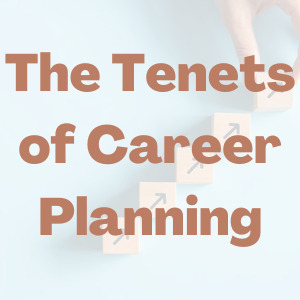 |
The Tenets of Career Planning |
Only a handful of people truly experience satisfaction and fulfillment on their jobs. This is not unconnected with the challenge of career planning. Without good career planning, an individual will most likely miss out on many opportunities that his/her career has to offer. Career planning enables you to prepare yourself ahead for the challenges and opportunities that may come your way.
Career planning is a contentious issue in the human resource profession owing to the confusion as to who is responsible for it - the individual or the organization? Given that organizations are made up of people with very different career goals and aspirations, how do we ensure these goals do not conflict with those of the corporate entity? An ideal situation is for both the employee and employer to play their roles in the career planning process in varying degrees. This is because the outcome of the career planning process affects both parties.
Another issue with career planning is that of spontaneity. Is it possible to deliberately direct the course of a person's career without the process being affected by uncontrollable externalities? Career planning involves making important decisions that lead to expected outcomes even though such decisions may sometimes be affected by other factors. Poor career planning has thrown people onto jobs that do not fit or align with their aptitudes, interests and aspirations.
An individual's career is his/her journey through learning, work and other relevant aspects of life. This is the reason why an individual can have multiple careers; the same person can round off a banking career spanning two decades and subsequently begin a career in the food industry. This shows that we all need to plan our careers whether as full-time employees or business owners.
There are three main aspects of career planning. These are:
- Career Information - This comprises useful information on the labor market, training programmes, job openings, counterpart salaries in other firms or sectors etc. Having up-to-date knowledge on these things helps you stay ahead of the pack in your chosen career. You ought to be familiar with training courses or programmes that can enable you to improve your skill set. Being skilled in the use of an accounting software is great for an accountant but taking a course in enterprise resource planning software will take his/her expertise to a whole new level. Also, knowing what your counterparts are earning in other organizations gives you an edge on the salary negotiation table. Knowledge is power.
- Career Assessment - This comprises psychometric tests and exercises that help to identify an individual's skills, interests, personality, values, aptitude, attributes etc. Just like you undergo medical examination to identify your blood group, rhesus factor and genotype, you should also subject yourself to psychometric testing to reveal your personality type, learning style, vocational inclination, temperament type and deep-seated attributes. Such information are reliable indicators of the career path you ought to tow to find fulfilment. Certain jobs are particularly suitable for extroverted persons as opposed to those who are introverted and vice versa.
- Career Counselling - This relates to getting useful advice, support and guidance from a competent person such as a human resource professional, qualified counsellor, career coach, trained psychologist or personal mentor. Career counselling is not usually a one-off meeting but a series of discussions with various people (perceived to be ahead of us career-wise) over a relatively long period of time. Career counselling can help you see things from a better perspective and take better informed decisions about your career. It can also enable you to identify things in your blind spot that could make a significant difference in your career. Career counselling is vital especially at the early stages of an individual's career and helps to avoid mistakes made by others.
Career management is a lifelong and self-monitored process of planning one's career(s) and involves setting and achieving career goals. So, career planning never stops, and it is constantly adapted to suit prevailing circumstances. Ideally, career planning should begin before an individual becomes economically active which implies that it should be initiated during an individual's schooling years.
As a matter of fact, sound career planning prepares the individual for the workplace and labor market. Everything cannot be set in stone during the formative years, but it is never too early to provide guidance and support for an individual's career path. Educational institutions at various levels that understand and appreciate the vital role of career planning in career success often hire career counsellors and coaches on a permanent basis.
However, the fact that you do not all have the privilege of being guided by a career counsellor is not an excuse for not taking responsibility for your career. Even if you don’t have a supportive career coach, you should still make reasonable effort to plan your career on your own. Set specific, measurable and time-bound career goals for yourself. Begin with the end in mind. Ask yourself what you want to get accomplished at the end of your career in a chosen profession or occupation. Review your career goals periodically to reflect changing circumstances. Be willing to take risks and leave your comfort zone. If you do not take on big challenges, you may never unearth some of the potentials that are hidden within you.
While you may be exceling on your job now, this should not stop you from aspiring to take on more responsibilities and higher roles in the short, medium and long-term. Dream big and set big hairy audacious goals for yourself. Membership of relevant professional groups and associations will not benefit you until you become active in them. Such groups give you excellent learning, growth and networking opportunities. Some people would only join professional bodies to comply with a statutory requirement not realizing that there's much more to gain from those bodies. An association of lawyers or accountants might enable you to secure jobs and contracts that you would not have been able to get on your own.
As you plan your career, always put work-life integration into consideration. Unless you find the right balance between your work and other aspects of your life, you would hardly be fulfilled in your career. When you make career decisions, always factor in family and other vital areas of your life. A career move may look good in the short term probably due to the financial rewards, but such a move could be disastrous some years down the line. Career planning starts now!
Have questions, suggestions, opinions on the topic? Jump in by writing in the comments box below.
Related Articles

|
Finding Your Why - Staying Committed to Your Job Against All OddsDuring a live television show in the United States, a music director was asked to sing the popular song ‘Amazing Grace’ and he sang it in a rather pedestrian manner. The talk show host then told him to sing it again but this time around with the consciousness that he survived after being [Read more]
|
Posted: 4 years ago |

|
Roadmap to Power Sector Reform in NigeriaThe availability of reliable Electric Power to the homes and businesses of our citizens has been one item in our national life that we have approached with so much hope and yet experienced so much frustration over the past decades. Various regimes, in the distant past, paid little attention to the s [Read more]
|
Posted: 16 years ago |

|
What Got You Here Wont Get You There: A Business PerspectiveIn today’s rapidly evolving business landscape, "What Got You Here Won't Get You There" serves as a crucial reminder for companies striving to maintain relevance and drive sustainable growth. As markets shift, technologies advance, and consumer expectations evolve, the strategies [Read more]
|
Posted: A year ago |


